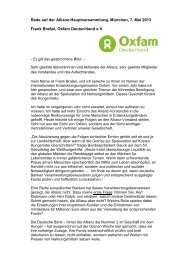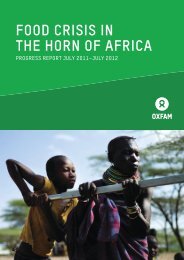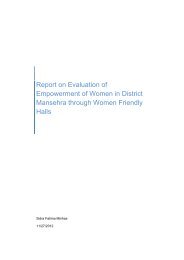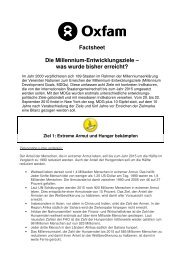No Time to Lose - Oxfam
No Time to Lose - Oxfam
No Time to Lose - Oxfam
You also want an ePaper? Increase the reach of your titles
YUMPU automatically turns print PDFs into web optimized ePapers that Google loves.
may be expected <strong>to</strong> use them in violation of international humanitarian<br />
law’ 85 – meaning that states engaged in the transfer of weapons<br />
should assess the extent <strong>to</strong> which recipient states are formally committed<br />
<strong>to</strong> respecting norms of international humanitarian law, and refuse<br />
<strong>to</strong> transfer weapons <strong>to</strong> those who ‘fail <strong>to</strong> diligently implement preventative<br />
and enforcement measures.’ 86<br />
Specific recommendations as <strong>to</strong> what this may require in the context<br />
of Afghanistan are provided below, but suffice <strong>to</strong> note that assisting<br />
states should ensure that appropriate vetting procedures are in place,<br />
that ANSF personnel are adequately trained in international humanitarian<br />
law, and that alleged violations of international humanitarian<br />
law result in credible, transparent investigations and prosecutions<br />
where appropriate.<br />
Under Domestic and Regional Law<br />
Some international forces also have obligations under their own domestic<br />
(or regional) laws <strong>to</strong> deny military assistance <strong>to</strong> security forces<br />
with a his<strong>to</strong>ry of human rights abuses, or where there is a risk that<br />
such assistance may be used <strong>to</strong> aid repression or <strong>to</strong> violate international<br />
humanitarian law. Some international forces also have obligations<br />
under domestic law (and/or policy) <strong>to</strong> report – and in some<br />
cases <strong>to</strong> take action <strong>to</strong> prevent – violations of international humanitarian<br />
law.<br />
Restrictions on the provision of military assistance<br />
In the case of US forces, the so-called ‘Leahy provisions’ in the annual<br />
Foreign Operations Appropriations Acts and Defense Appropriations<br />
Acts prohibit the provision of military assistance <strong>to</strong> any unit of the<br />
security forces of a foreign country where there is credible evidence<br />
that such unit has committed gross violations of human rights. 87<br />
Gross violations of human rights, for the purposes of the legislation,<br />
include ‘<strong>to</strong>rture or cruel, inhuman or degrading treatment or punishment’<br />
and ‘other flagrant denial of the right <strong>to</strong> life, liberty or the security<br />
of the person’. 88<br />
The Leahy provision in the Foreign Appropriations Acts applies <strong>to</strong><br />
funding for weapons and training, while the corresponding provision<br />
in the Defense Acts applies only <strong>to</strong> training. Where credible evidence<br />
of gross human rights violations exists, assistance may nevertheless be<br />
provided if, in the case of funds appropriated under the Foreign Operations<br />
Appropriations Acts, the host country is ‘taking effective<br />
measures <strong>to</strong> bring the responsible members of the security forces unit<br />
<strong>to</strong> justice’, or in the case of funds appropriated under the Defense Appropriations<br />
Acts, ‘all necessary corrective steps have been taken’. 89<br />
19






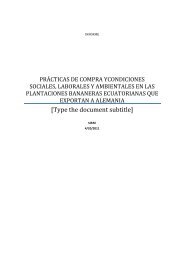
![Download: Faltposter EU-Handelspolitik [PDF 2,17MB] - Germanwatch](https://img.yumpu.com/25095854/1/190x161/download-faltposter-eu-handelspolitik-pdf-217mb-germanwatch.jpg?quality=85)
